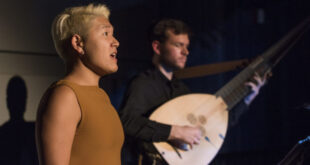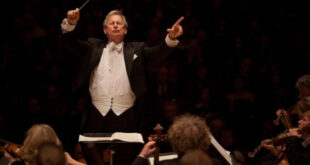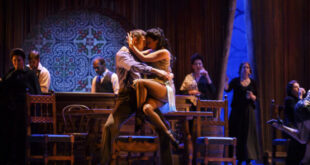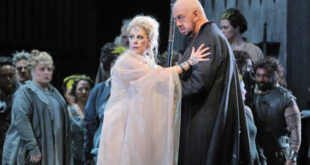 When people say they are “going to the opera,” the chances are pretty good that they will be taking in one or another piece from the standard repertoire. That’s what I call the sixty-or-so operas that are most often staged by any decent company. In my lifetime, this standard repertoire has expanded and shrunk — some few works have entered in for a short while others are dropped. But the list of the most popular works — all masterpieces that have stood the test of time — remains pretty much the same. The oldest opera in this repertoire is — and has been for over a century — “Le nozze di Figaro” (1786), an “Italian” opera by Wolfgang Amadeus Mozart (1756-1791).
When people say they are “going to the opera,” the chances are pretty good that they will be taking in one or another piece from the standard repertoire. That’s what I call the sixty-or-so operas that are most often staged by any decent company. In my lifetime, this standard repertoire has expanded and shrunk — some few works have entered in for a short while others are dropped. But the list of the most popular works — all masterpieces that have stood the test of time — remains pretty much the same. The oldest opera in this repertoire is — and has been for over a century — “Le nozze di Figaro” (1786), an “Italian” opera by Wolfgang Amadeus Mozart (1756-1791).
This fact raises an important question. The first opera was composed in Florence in 1597, nearly two centuries before “Figaro”. What — were the many works composed back then nothing but chopped liver? No, many of them are very beautiful, conceived by geniuses like Monteverdi, Vivaldi and Handel. But they were created for a different society than that which emerged from the tumultuous eighteenth century. The new post-American-and-French-revolutionary world, of which Mozart was such a quintessential representative, demanded a fresh kind of theater and a new kind of opera, where the drama had more relevance to the day-to-day of its audiences’ lives than before, and men characters were men and women characters were women — no more “castrati!”
But it was no easy task to get “Figaro” on the boards in Vienna. That was mainly because Mozart had been frozen out of the Italian opera business by the Viennese musical establishment, made up almost wholly of Italians. The little genius from Salzburg was allowed to compose symphonies, chamber music concertos — even a German opera (“Die Entführung aus dem Serail” – 1782). But Italian opera was where the big money was, and the group of imported musicians led by Antonio Salieri did everything they could to keep Mozart from competing with them in this realm. That’s because they knew, ever since Mozart decided to set up shop in Vienna in 1782, that — Austrian or not — he could compose Italian opera head-and-shoulders better than they could — there was simply no comparison.
As long as the Italians managed to remain united and to hold firm, they presented an impermeable wall between Mozart with his gnawing hunger to compose Italian opera, and Emperor Josef II, who had so many things on his plate that he basically left all decisions about the musical theater to Salieri. This was so ironic because Mozart’s dad, Leopold, who of course realized that his son was an incredible prodigy, was also aware that the composition of Italian opera was where the real money was, it being the nobility’s favorite form of entertainment. So he had taken “Das Wunderkind” on several trips to Italy, where the young man would learn to speak and write fluent Italian and, most importantly, to compose opera in the Italian style.
We can understand how the Italians of the Viennese musical establishment felt about Mozart coming onto the scene — it’s just human nature. If, where you work, someone comes along who can do your job infinitely better than you can, how are you going to feel about that person? Are you likely to give him or her all the possible help that you can? Probably not. And for several years the Austrian court Italians all did what they could to keep Mozart away from Italian opera. Then finally (thank God!), one of their number broke ranks.
In the film noir, “In a Lonely Place” (1950), Humphrey Bogart says something like, “It’s amazing what a person will do for a slice of immortality.” I always remember this line when I think of Lorenzo da Ponti (1749-1838) and how he helped Mozart stage his first Italian opera in Vienna. Lorenzo da Ponti was the Imperial Court Poet at the time and he could see that Mozart, unlike his Italian compatriots, was a composer for the ages. A lot of things — good and bad — are said about da Ponti — but two I firmly believe. One is that da Ponti absolutely was concerned with his name living on forever and that being associated with Mozart as opposed to the other run-of-the-mill composers would accomplish this. The second (which comes from the poet’s often unreliable memoirs), is that he had the clout to go directly to the Emperor and, in fact, he did exactly that to persuade Josef to allow Mozart to stage “Le nozze di Figaro” (which the monarch had banned as a play!).
When the scheduling of “Figaro” was a done deal, this did not stop the Italians from doing everything they could to make sure that it did not succeed, including enlisting the cooperation of certain singers and dancers to make things tough for Mozart. The opera did okay in its Vienna run, but was by no means the triumph Mozart had hoped for. It was probably just too new for the audiences. The fact that it is the oldest opera in the modern repertoire shows that it marked a significant turning point with the past. But in Prague it was an unprecedented success, and because of this Mozart was invited to the Bohemian capital to give a gala concert.
Most of the time Mozart spent in Vienna was very depressing for the little man with the enormous gift, although there is no composer, including Rossini, who musically expressed such a great sense of humor. But he got a welcome break from his sorrowful situation when he arrived in Prague in early January, 1787. What a thrill it must have been to hear tunes from “Figaro” played everywhere! The city had gone Mozart-crazy! And the royal treatment he received…In his entire short life he was never respected for his genius as he should have been, the way he was in Prague. On January 19, he performed the Piano Concerto No. 25 and led for the first time his Symphony No. 38 (“The Prague”). The crowd went wild and he was invited to return in the fall to compose a new opera for the city. That opera would be “Don Giovanni” with a libretto by da Ponti. There is no question that the time surrounding the composition and the staging of “Don Giovanni” were the happiest days of Mozart’s life.
“Don Giovanni” is the “Hamlet” of opera. By that I mean that there is more written and argued about the piece than any other opera, just as Shakespeare’s mighty tragedy has generated more study and criticism than any other play. I myself have written and lectured about this amazing work countless times — like any true masterpiece there’s always something new to say about it. One thing’s for sure — it’s probably the only composition in which Mozart’s full range of musical expression is on display.
For now I’ll just share a (probably mostly true) story with you that’s come down over the years. It’s about the overture. The “Overture to Don Giovanni” is a great piece well known to even non opera-goers because it is often played on orchestra programs. The circumstances of its composition, however, are quite interesting and not well known. Mozart, it is true, was a party animal. He loved to drink huge amounts of wine and flirt with pretty girls. And when he was in Prague for “Giovanni’s” premiere he was especially having a great time every night. He was enjoying himself so much that he procrastinated in writing out the orchestra parts to the overture — after all he had the whole thing done in his head. What to worry? But the impresario and others were getting quite nervous. It was the day before the all-important dress rehearsal, the musicians needed their parts, and here Wolfie planned to party hard well into the night!
After some discussion by those close to the composer, he was lured into an upper room of the villa where he was staying and he was locked in with a bed, a table, a sheaf of blank music paper, a quill and ink, a chamber pot and his wife Constanze to keep him company. (He did not need a piano.) Despite his protests and promises to write out the parts the next day, he was told that he would not be released from this impromptu cell until the overture was completed. We are told that when he became fatigued from the drudgery of writing down the notes, Stanzi caressed his head gently and read fairy tales to him.
We are most fortunate that Lyric Opera is producing “Don Giovanni” to kick off the 2014-2015 season. Anyone who has not seen it should really try to take this one in. It has some of the funniest scenes in all of opera and fantastic music from beginning to end.
It features Mariusz Kwiecien as Don Giovanni, Marina Rebeka as Donna Anna, Ana Maria Martinez as Donna Elvira, Kyle Ketelsen as Leporello, Adriana Chuchman as Zerlina, Antonio Poli as Don Ottavio, Michael Sumuel as Masetto and Andrea Silvestrelli as Commendatore.
Sir Andrew Davis will conduct, Robert Falls will direct and Walt Spangler will do ethe set design for the production.
Performance Dates are September 27 and 30, and October 2, 5, 8, 11, 14, 17, 24 and 29 For tickets or more info, visit www.lyricopera.org or call 312-827-5600.
 Fra Noi Embrace Your Inner Italian
Fra Noi Embrace Your Inner Italian






